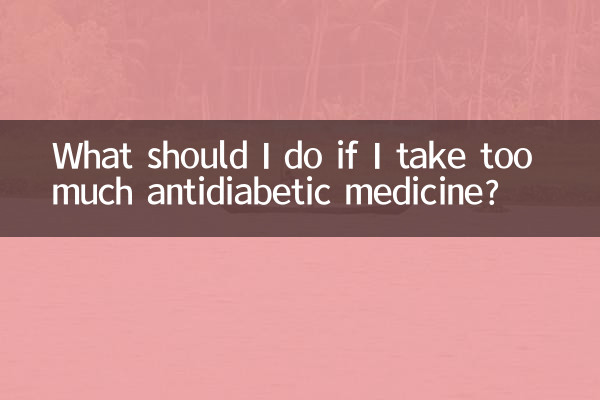What should I do if I take too much antidiabetic medicine?
As the number of diabetic patients increases, the use of antidiabetic drugs is becoming more and more common. However, overdosing on antidiabetic drugs can cause serious health problems. This article will combine the hot topics and hot content on the Internet in the past 10 days to provide you with detailed answers on what to do if you take too many anti-diabetic drugs, and provide structured data for reference.
1. Common symptoms of overdose of antidiabetic drugs

Overdose of antidiabetic drugs may cause hypoglycemia or other adverse reactions. The following are common symptoms:
| Symptom type | Specific performance |
|---|---|
| mild hypoglycemia | Dizziness, sweating, palpitation, hunger |
| moderate hypoglycemia | Difficulty concentrating, slurred speech, unsteady gait |
| severe hypoglycemia | Confusion, convulsions, coma |
| Other reactions | Nausea, vomiting, abdominal pain, allergic reactions |
2. Emergency treatment measures for overdose of antidiabetic drugs
If you find that you have taken too many hypoglycemic drugs, you should take the following measures immediately:
| Processing steps | Specific operations |
|---|---|
| first step | Check blood sugar levels instantly |
| Step 2 | If you are conscious, immediately eat 15-20 grams of fast-glycemic foods (such as sugar cubes, juice) |
| Step 3 | Check blood sugar again after 15 minutes. If it is still low, replenish sugar. |
| Step 4 | If the patient is unconscious, do not feed him or her and seek medical attention immediately or call emergency services. |
| Step 5 | Keep the medicine bottle or packaging for reference by medical staff |
3. How to deal with overdose of different anti-diabetic drugs
The treatment of overdose of different types of anti-diabetic drugs is different. The following are the characteristics and treatment suggestions of common overdose of anti-diabetic drugs:
| drug type | Overdose characteristics | Handling suggestions |
|---|---|---|
| Sulfonylureas | Long duration of action, high risk of hypoglycemia | Blood sugar needs to be continuously monitored for 24-48 hours, and hospitalization may be required. |
| Biguanides | May cause lactic acidosis | Closely monitor lactate levels and perform hemodialysis if necessary |
| insulin | Hypoglycemia attacks quickly and severely | Continuous intravenous infusion of glucose is required and close monitoring is required |
| SGLT-2 inhibitors | May cause ketoacidosis | Monitor blood ketones and acid-base balance, and replenish intravenous fluids if necessary |
4. Suggestions on preventing overdose of hypoglycemic drugs
Prevention is better than cure, so here are some practical tips to avoid overdose:
| Precautions | Specific instructions |
|---|---|
| Medication management | Use a medicine divider box to set medication reminders to avoid repeated medication |
| blood glucose monitoring | Monitor blood sugar regularly and establish a medication diary |
| Diet coordination | Eat regular meals and avoid taking medication on an empty stomach |
| Doctor-patient communication | Regular follow-up visits and timely adjustments to medication plans |
| emergency preparedness | Carry a warning card about rapidly rising glycemic foods and medical information with you |
5. When you need immediate medical attention
Seek medical attention or call emergency services immediately if:
| dangerous situation | Countermeasures |
|---|---|
| loss of consciousness | Call first aid immediately and lie on your side to prevent suffocation |
| persistent low blood sugar | Still lower than 3.9mmol/L after supplementing sugar |
| convulsive seizures | Prevent injury and seek medical attention immediately |
| massive overdose | Even if you are asymptomatic, you should seek medical evaluation |
| Combined symptoms | Such as chest pain, difficulty breathing, etc. |
6. Dangers of long-term overdose
Long-term overdose of antidiabetic drugs may cause the following health problems:
| Hazard type | specific impact |
|---|---|
| nervous system | Repeated hypoglycemia can lead to cognitive decline |
| cardiovascular system | Increased risk of cardiac arrhythmias and cardiovascular events |
| Metabolic disorders | Affects fat and protein metabolism |
| drug toxicity | Certain drugs may damage liver and kidney function |
| psychological impact | Anxiety or fear about taking medication |
7. Expert advice and summary
According to recent public advice from medical experts:
1.Do not adjust the dosage on your own: Any changes in medication should be discussed with a doctor
2.Pay attention to medication education: Understand the mechanisms of action and potential risks of the drugs you use
3.Build a support system: Inform family members about medication use and pay attention to medication safety together
4.Regularly evaluate the plan: As the condition changes, the treatment plan may need to be adjusted
5.maintain a healthy lifestyle: Reasonable diet and moderate exercise can reduce drug dependence
Antidiabetic medications are important tools in managing diabetes, but they must be used correctly. In case of overdose, stay calm, follow the above steps, and seek medical attention if necessary. The key to preventing medication errors is to establish standardized medication habits and strengthen self-management awareness.

check the details

check the details